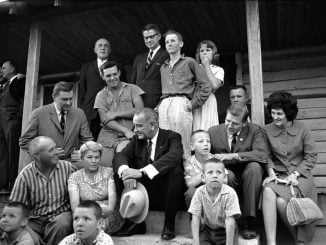
Nov. 7
1916: Jeannette Rankin of Montana won election to the U.S. House of Representatives, becoming the first woman elected to either chamber of Congress.
1917: Russia’s Bolshevik Revolution took place as forces led by Vladimir Ilyich Lenin overthrew the provisional government of Alexander Kerensky.
1944: President Franklin D. Roosevelt won an unprecedented fourth term in office.
1991: Basketball star Magic Johnson announced that he had tested positive for HIV and was retiring.
Nov. 8
1889: Montana was admitted to the Union as the 41st state.
1960: John F. Kennedy won the U.S. presidential election over Vice President Richard M. Nixon.
2013: Typhoon Haiyan, one of the most powerful storms ever recorded, slammed into the central Philippines, leaving more than 7,300 people dead or missing and displacing more than 5 million.
2016: Republican Donald Trump was elected America’s 45th president, defeating Democrat Hillary Clinton.
Nov. 9
1906: Theodore Roosevelt made the first trip abroad of any sitting president in order to observe construction of the Panama Canal.
1935: United Mine Workers President John L. Lewis and other labor leaders formed the Committee for Industrial Organization.
1938: Nazis looted and burned synagogues as well as thousands of Jewish-owned stores and houses in Germany and Austria in a pogrom, or deliberate persecution, that became known as “Kristallnacht.”
1989: The Berlin Wall fell after 28 years when communist East Germany opened its borders, allowing citizens to travel freely to the West for the first time in decades.
Nov. 10
1775: The U.S. Marines were organized under authority of the Continental Congress.
1871: Journalist-explorer Henry M. Stanley found Scottish missionary David Livingstone, who had not been heard from for years, near Lake Tanganyika in central Africa.
1969: The children’s educational program “Sesame Street” debuted on National Educational Television.
Nov. 11
1620: Forty-one Pilgrims aboard the Mayflower, anchored off Massachusetts, signed a compact calling for a “body politick.”
1921: The remains of an unidentified American service member were interred in the Tomb of the Unknown Soldier at Arlington National Cemetery in a ceremony presided over by President Warren G. Harding.
1918: Fighting in World War I ended as the Allies and Germany signed an armistice in the Forest of Compiegne.
Nov. 12
1927: Josef Stalin became the undisputed ruler of the Soviet Union as Leon Trotsky was expelled from the Communist Party.
1936: The San Francisco-Oakland Bay Bridge opened.
1942: The World War II Naval Battle of Guadalcanal began.
Nov. 13
1789: Benjamin Franklin wrote in a letter to a friend, Jean-Baptiste Leroy: “In this world nothing can be said to be certain, except death and taxes.”
1982: The Vietnam Veterans Memorial was dedicated on the National Mall in Washington, D.C.
1985: S volcanic mudslide buried Armero, Colombia, killing 23,000 residents.
2015: Islamic State militants carried out a set of coordinated attacks in Paris on the national stadium, restaurants and streets, and a crowded concert hall, killing 130 people in the worst attack on French soil since World War II.



